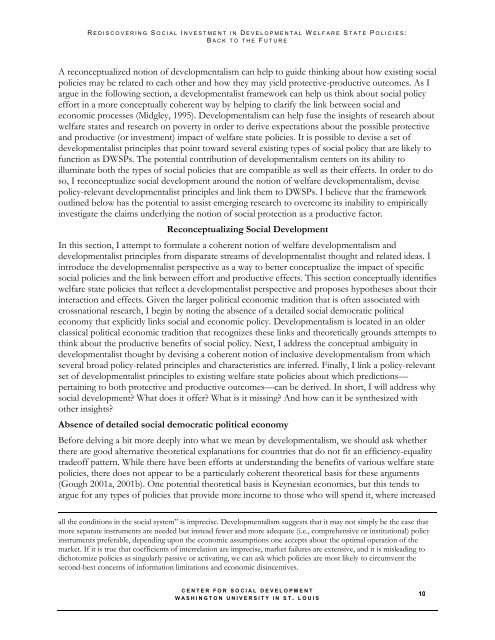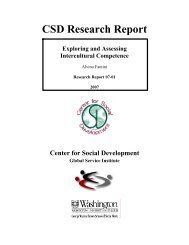Rediscovering social investment in developmental welfare state ...
Rediscovering social investment in developmental welfare state ...
Rediscovering social investment in developmental welfare state ...
Create successful ePaper yourself
Turn your PDF publications into a flip-book with our unique Google optimized e-Paper software.
R E D I S C O V E R I N G S O C I A L I N V E S T M E N T I N D E V E L O P M E N T A L W E L F A R E S T A T E P O L I C I E S :<br />
B A C K T O T H E F U T U R E<br />
A reconceptualized notion of <strong>developmental</strong>ism can help to guide th<strong>in</strong>k<strong>in</strong>g about how exist<strong>in</strong>g <strong>social</strong><br />
policies may be related to each other and how they may yield protective-productive outcomes. As I<br />
argue <strong>in</strong> the follow<strong>in</strong>g section, a <strong>developmental</strong>ist framework can help us th<strong>in</strong>k about <strong>social</strong> policy<br />
effort <strong>in</strong> a more conceptually coherent way by help<strong>in</strong>g to clarify the l<strong>in</strong>k between <strong>social</strong> and<br />
economic processes (Midgley, 1995). Developmentalism can help fuse the <strong>in</strong>sights of research about<br />
<strong>welfare</strong> <strong>state</strong>s and research on poverty <strong>in</strong> order to derive expectations about the possible protective<br />
and productive (or <strong><strong>in</strong>vestment</strong>) impact of <strong>welfare</strong> <strong>state</strong> policies. It is possible to devise a set of<br />
<strong>developmental</strong>ist pr<strong>in</strong>ciples that po<strong>in</strong>t toward several exist<strong>in</strong>g types of <strong>social</strong> policy that are likely to<br />
function as DWSPs. The potential contribution of <strong>developmental</strong>ism centers on its ability to<br />
illum<strong>in</strong>ate both the types of <strong>social</strong> policies that are compatible as well as their effects. In order to do<br />
so, I reconceptualize <strong>social</strong> development around the notion of <strong>welfare</strong> <strong>developmental</strong>ism, devise<br />
policy-relevant <strong>developmental</strong>ist pr<strong>in</strong>ciples and l<strong>in</strong>k them to DWSPs. I believe that the framework<br />
outl<strong>in</strong>ed below has the potential to assist emerg<strong>in</strong>g research to overcome its <strong>in</strong>ability to empirically<br />
<strong>in</strong>vestigate the claims underly<strong>in</strong>g the notion of <strong>social</strong> protection as a productive factor.<br />
Reconceptualiz<strong>in</strong>g Social Development<br />
In this section, I attempt to formulate a coherent notion of <strong>welfare</strong> <strong>developmental</strong>ism and<br />
<strong>developmental</strong>ist pr<strong>in</strong>ciples from disparate streams of <strong>developmental</strong>ist thought and related ideas. I<br />
<strong>in</strong>troduce the <strong>developmental</strong>ist perspective as a way to better conceptualize the impact of specific<br />
<strong>social</strong> policies and the l<strong>in</strong>k between effort and productive effects. This section conceptually identifies<br />
<strong>welfare</strong> <strong>state</strong> policies that reflect a <strong>developmental</strong>ist perspective and proposes hypotheses about their<br />
<strong>in</strong>teraction and effects. Given the larger political economic tradition that is often associated with<br />
crossnational research, I beg<strong>in</strong> by not<strong>in</strong>g the absence of a detailed <strong>social</strong> democratic political<br />
economy that explicitly l<strong>in</strong>ks <strong>social</strong> and economic policy. Developmentalism is located <strong>in</strong> an older<br />
classical political economic tradition that recognizes these l<strong>in</strong>ks and theoretically grounds attempts to<br />
th<strong>in</strong>k about the productive benefits of <strong>social</strong> policy. Next, I address the conceptual ambiguity <strong>in</strong><br />
<strong>developmental</strong>ist thought by devis<strong>in</strong>g a coherent notion of <strong>in</strong>clusive <strong>developmental</strong>ism from which<br />
several broad policy-related pr<strong>in</strong>ciples and characteristics are <strong>in</strong>ferred. F<strong>in</strong>ally, I l<strong>in</strong>k a policy-relevant<br />
set of <strong>developmental</strong>ist pr<strong>in</strong>ciples to exist<strong>in</strong>g <strong>welfare</strong> <strong>state</strong> policies about which predictions—<br />
perta<strong>in</strong><strong>in</strong>g to both protective and productive outcomes—can be derived. In short, I will address why<br />
<strong>social</strong> development? What does it offer? What is it miss<strong>in</strong>g? And how can it be synthesized with<br />
other <strong>in</strong>sights?<br />
Absence of detailed <strong>social</strong> democratic political economy<br />
Before delv<strong>in</strong>g a bit more deeply <strong>in</strong>to what we mean by <strong>developmental</strong>ism, we should ask whether<br />
there are good alternative theoretical explanations for countries that do not fit an efficiency-equality<br />
tradeoff pattern. While there have been efforts at understand<strong>in</strong>g the benefits of various <strong>welfare</strong> <strong>state</strong><br />
policies, there does not appear to be a particularly coherent theoretical basis for these arguments<br />
(Gough 2001a, 2001b). One potential theoretical basis is Keynesian economics, but this tends to<br />
argue for any types of policies that provide more <strong>in</strong>come to those who will spend it, where <strong>in</strong>creased<br />
all the conditions <strong>in</strong> the <strong>social</strong> system‖ is imprecise. Developmentalism suggests that it may not simply be the case that<br />
more separate <strong>in</strong>struments are needed but <strong>in</strong>stead fewer and more adequate (i.e., comprehensive or <strong>in</strong>stitutional) policy<br />
<strong>in</strong>struments preferable, depend<strong>in</strong>g upon the economic assumptions one accepts about the optimal operation of the<br />
market. If it is true that coefficients of <strong>in</strong>terrelation are imprecise, market failures are extensive, and it is mislead<strong>in</strong>g to<br />
dichotomize policies as s<strong>in</strong>gularly passive or activat<strong>in</strong>g, we can ask which policies are most likely to circumvent the<br />
second-best concerns of <strong>in</strong>formation limitations and economic dis<strong>in</strong>centives.<br />
C E N T E R F O R S O C I A L D E V E L O P M E N T<br />
W A S H I N G T O N U N I V E R S I T Y I N S T . L O U I S<br />
10
















